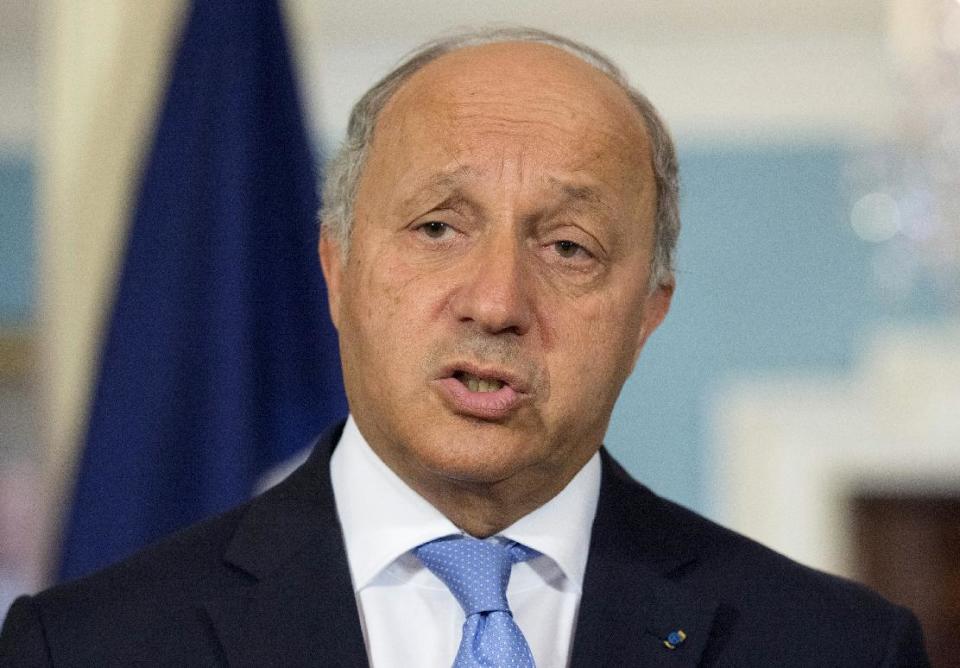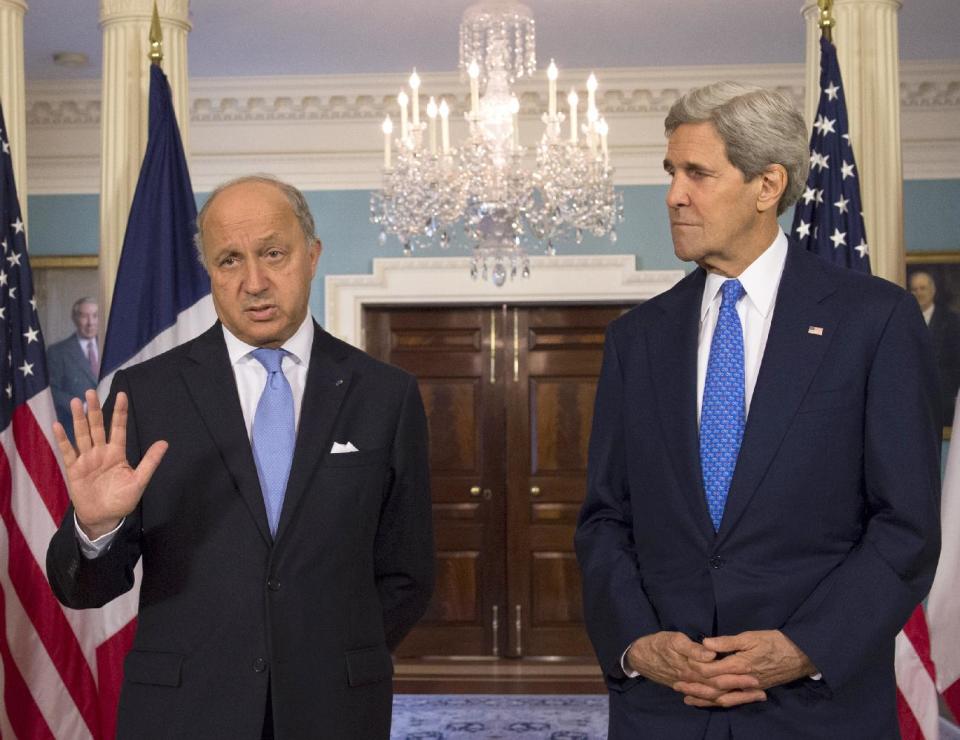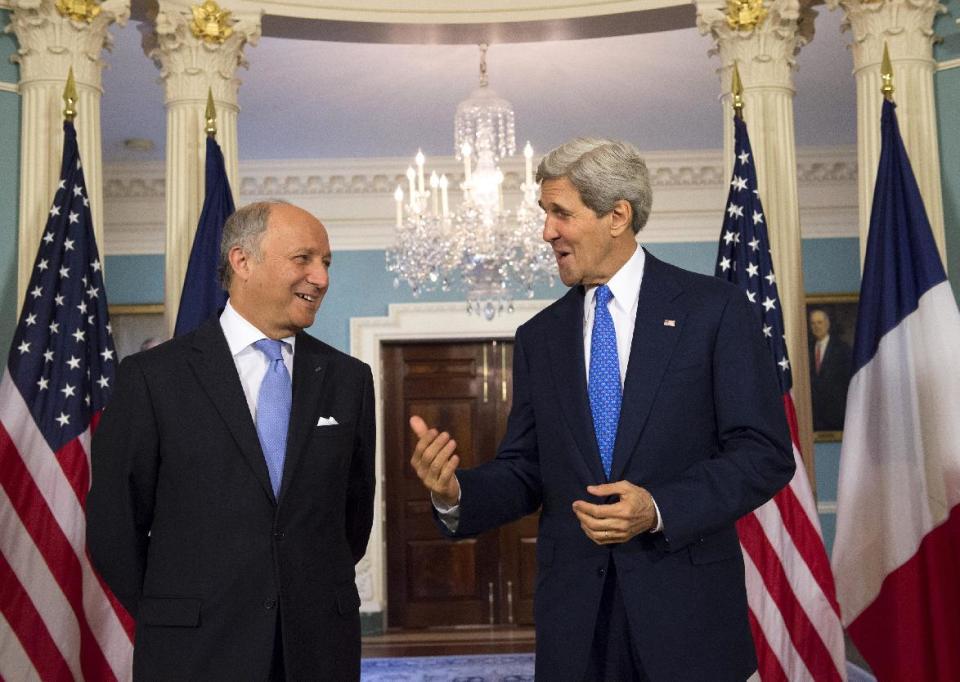France: Syria launched 14 toxic attacks since Oct
WASHINGTON (AP) — France's foreign minister on Tuesday accused the Syrian government of attacking its people with chemical weapons at least 14 times since October, including as recently as a few weeks ago.
Speaking to reporters in Washington, Laurent Fabius cited "credible witnesses" to the attacks, which he said included the use of chlorine gas. He said it has been difficult to garner definitive proof because chlorine gas generally evaporates too quickly to collect samples.
Under the threat of U.S. airstrikes last summer, Syrian President Bashar Assad agreed to dismantle his chemical weapons program. Currently, a joint mission by the U.N. and the international chemical weapons watchdog says that 92 percent of Syria's stockpile has been shipped out of the country to be destroyed at sea.
But Fabius said that Syrian facilities that produce chemical weapons have not been destroyed, and he accused Assad's government of not being fully forthcoming with the West about its continued ability to use toxic chemicals against opponents.
The suspected use of chlorine gas, for example, "shows that the regime of Bashar Assad is still capable of producing chemical weapons, and determined to use them," Fabius told reporters.
He described the 14 attacks since last October 25 as "small-scale" and not likely to spur a Western military response.
It's widely suspected that a chlorine gas attack sickened dozens of people last month in areas controlled by rebel forces that are seeking to oust Assad in a civil war that has killed at least 150,000 people. But Western officials so far have been unable to offer any concrete proof of the attack, or that Assad's troops launched it.
The Syrian government has denied using chlorine, and has instead accused rebels of employing it on the battlefield.
The Organization for the Prohibition of Chemical Weapons, which monitors the implementation of the Chemical Weapons Convention, sent a team to Syria this month to investigate the chlorine claims.
In a report Tuesday, Human Rights Watch said evidence "strongly suggests" that Syrian government helicopters dropped bombs carrying chlorine gas on three towns near a military base last month. Those attacks killed at least 11 people, and wounded as many as 500, it said.
Chlorine gas in bombs is not very lethal, but the rights group said it appeared to have been used to terrorize residents and cause widespread panic.
Human Rights Watch said testimony from eye-witnesses, including medics, showed the wounded suffered from exposure to chlorine gas, and there were canister fragments that showed the labels of the factory where the canisters were produced.
The group said two attacks took place in the town of Kfar Zeita, on April 11 and April 18, and killed two people. The town of Temanaa was attacked on April 13 and 18, killing six people, it said. An attack on the town of Telmans on April 21 killed three, according to HRW.
Although chlorine canisters are widely-available and easy to use, Nadim Houry of Human Rights Watch said the government was the most likely perpetrator.
"This happened on multiple days, in different locations, and there is a consistency in what happened," Houry said. "That's what gave us that level of confidence to say there is strong evidence pointing in this direction."
The report also noted that the evidence indicated that the bombs were dropped from helicopters, and the Syrian government is the only actor in the conflict with helicopters and planes.
HRW said half of the witnesses it spoke to reported seeing clouds of yellowish smoke as the bombs went off, which is consistent with chlorine gas.
Remnants of the canisters indicated they were dropped from a significant height, and the attacks came over several days, each with consistent testimony, the group said.
"I was less than one kilometer (half mile) away and saw the helicopter roaming and dropping the bomb," Human Rights Watch quoted an unidentified eye-witness from Telmans as saying. "I followed the dark yellowish smoke ... As soon as I arrived I smelled a horrible, strong smell. I started coughing and tears came from my eyes. People around me were suffocating."
Human Rights Watch underscored that the use of chlorine gas as a weapon is prohibited under international law.
"This is one more reason for the U.N. Security Council to refer the situation in Syria to the International Criminal Court," Houry said.
Fabius also signaled some frustration with U.S. and British refusals to launch airstrikes against Assad after the massive chemical weapons attack in August that killed at least several hundred people.
He cited President Barack Obama's "red line" pledge to order a harsh response if Assad launched toxic chemicals against his own people, but said Paris could not alone respond once Washington and London backed off the threat.
"It was out of the question for France to act alone," Fabius said. "We regret that, because we believe it would have changed many things, in many respects."
France is pushing the United Nations to refer Assad and his top officials to the International Criminal Court for crimes against humanity, and Fabius said a U.N. Security Council vote could come as soon as Tuesday. But it's likely that Russia, which is a permanent Security Council member, will veto the move.
Fabius, speaking in English and French, also lambasted as "a tragical mockery" the Syrian presidential elections set for June 3 that Assad is expected to win. He said France, like Germany, has decided it will not help facilitate the vote among Syrian populations in their respective counties.
Syria's main Western-backed opposition group welcomed the decision from France and Germany, and said in a statement that other countries should to take similar measures in an international boycott of the vote.



